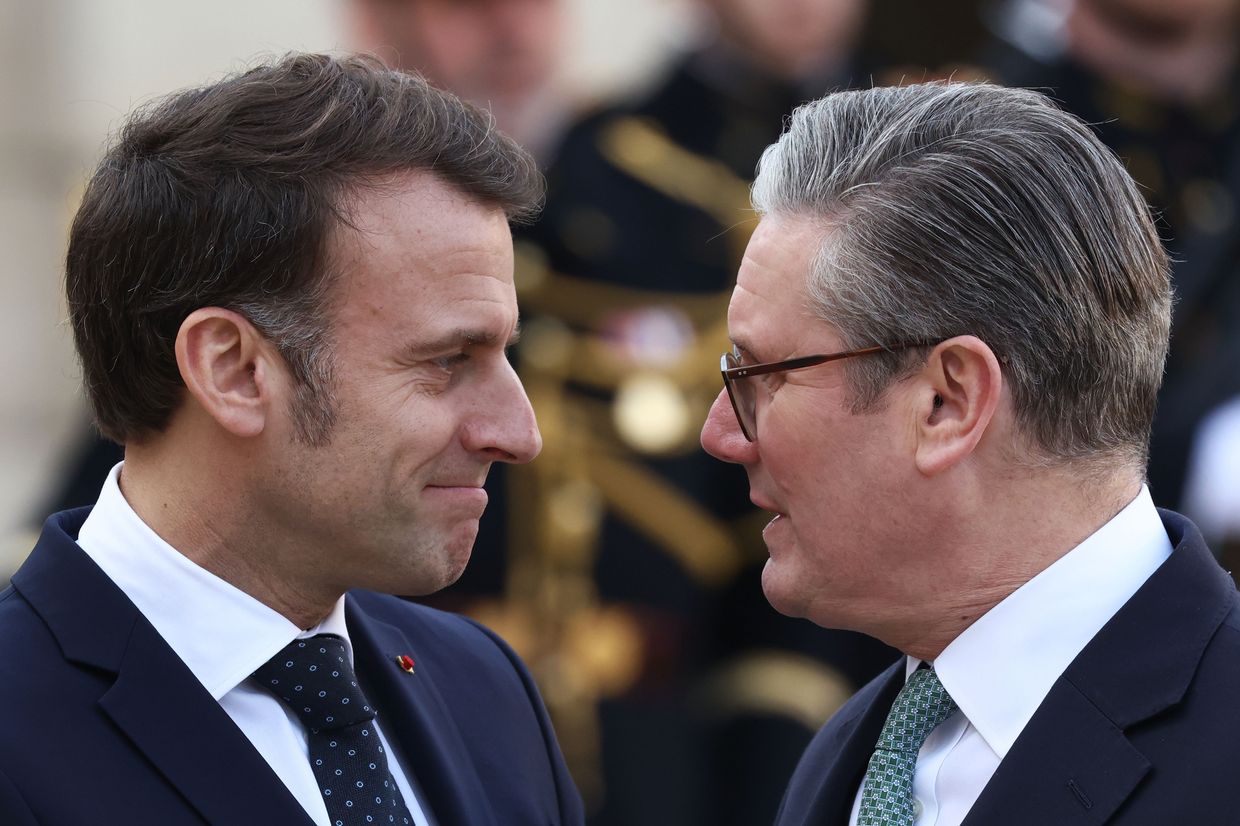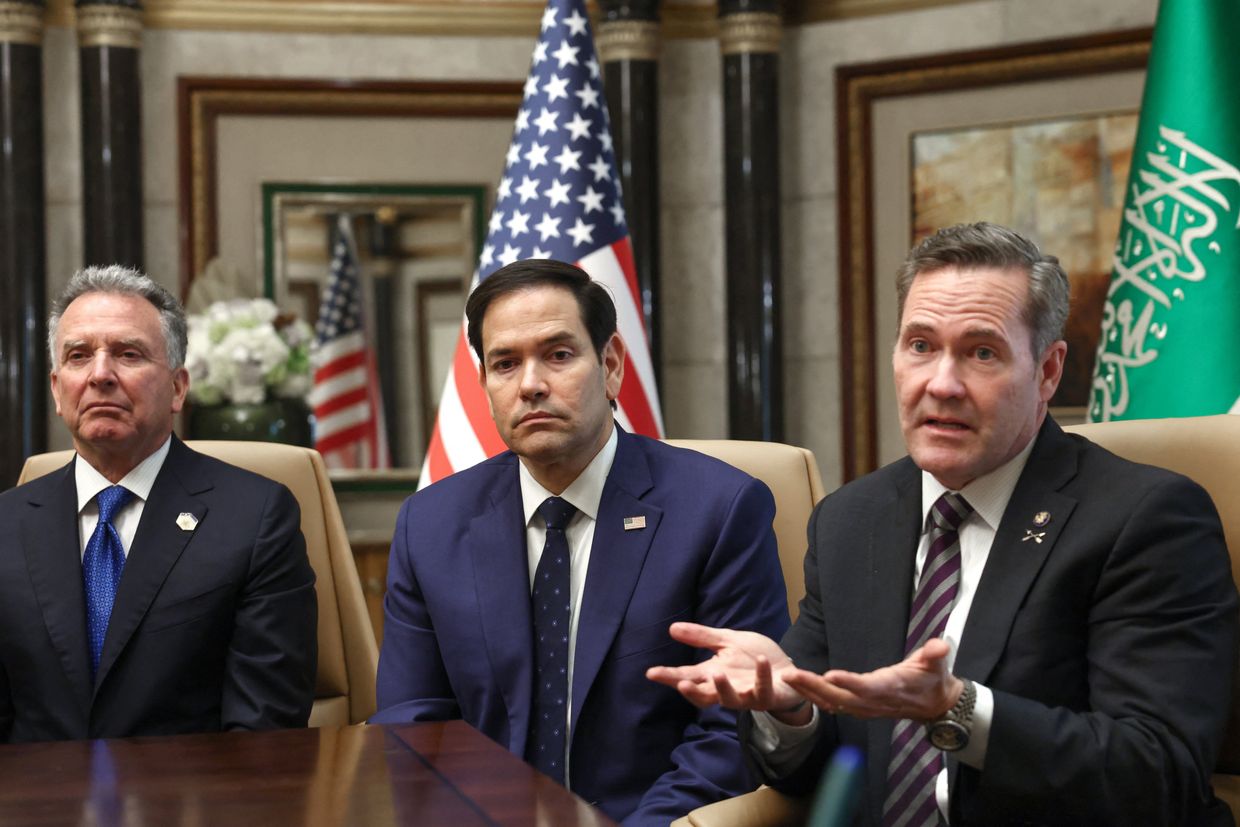US-Russia talks on Ukraine peace — why Putin will be ‘very happy’

U.S. and Russian officials attend a meeting together at Riyadh's Diriyah Palace on February 18, 2025 (Evelyn Hockstein / POOL / AFP)
Russia on Feb. 18 ended years of political isolation sparked by its full-scale invasion of Ukraine, as a delegation of Kremlin officials met with their U.S. counterparts in Saudi Arabia to discuss how to end the very war it started.
The talks ended with little in the way of concrete agreements, but the very fact it happened — without Ukraine — is a huge win for Moscow.
"Even if nothing comes of it, the fact that Russian and American senior officials sat down together behind closed doors and talked about this issue without the Ukrainians there — that's huge," Jenny Mathers, a Russian political expert and lecturer at the U.K.'s Aberystwyth University, told the Kyiv Independent.
"That's absolutely huge, and (Russian President Vladimir) Putin must be very, very happy about all of that."
What was agreed?
The talks in Saudi Arabia marked the first direct negotiations between the U.S. and Russia since Moscow's full-scale invasion began, with Russia's delegation, led by Foreign Minister Sergey Lavrov, sitting down with U.S. Secretary of State Marco Rubio and other officials.
"This is only the very tentative start of a bilateral process," former U.K. Defense Attache in Moscow, John Foreman, told the Kyiv Independent, stressing that "nothing much" had been decided as they're "talks, not negotiations."
The U.S. delegation was keen to stress that today's talks were just the start of a "long and difficult journey, though Rubio said he is "convinced" Russia is "willing to begin to engage in a serious process" to end its full-scale invasion.
"Putin will be glad with the photo op and Russia being portrayed as a superpower on the level of the U.S. when it’s nowhere near."
Speaking after the talks concluded, Russia's Lavrov said three main points had been agreed on — restoring embassy staffing for further diplomatic missions, appointing representatives to further the negotiation process, and creating the necessary conditions for restarting U.S.-Russia relations.

"Putin will be glad with the photo op and Russia being portrayed as a superpower on the level of the U.S. when it’s nowhere near," Foreman said.
What did Russia say?
The initial response from the Russian delegation was rather muted, with Yuri Ushakov, an advisor to Putin, saying the talks were "not bad," but it was "hard to say" if the two sides' interests were converging.
"We have agreed to take account of each other's interests and develop bilateral relations, since both Moscow and Washington are interested in this," he added.
While the talks were underway, Kremlin spokesperson Dmitry Peskov said Putin is ready for talks with Zelensky, but "legal aspects related to his legitimacy" must be considered.
Russia has widely used the claim that Zelensky is illegitimate in its propaganda to discredit the Ukrainian government. The false claim is based on the premise that Zelensky's first term in office was originally meant to end on May 20, 2024.
But Russia's full-scale invasion and the subsequent declaration of martial law in Ukraine has meant elections have been impossible to hold and his term has been extended, something constitutional lawyers say is allowed under Ukrainian law.
Speaking after the talks ended, Lavrov continued the attacks on Zelensky, saying that he and his team should be "calmed down" following a Ukrainian drone strike on a pumping station in Russia's Kuban region on Feb. 17.


"This should only strengthen everyone in the opinion that this can't go on, that this man and his entire team should be calmed down, given a slap on the wrist," he said, ignoring Russia's years-long attacks on Ukrainian civilian infrastructure conducted since it launched its unprovoked full-scale invasion.
Mathers said Lavrov being able to say such things on the world stage was "particularly galling," adding that how the talks were being conducted gave the appearance that there is "absolutely no acknowledgement by the Americans that Russia is the party in the wrong."
What did the U.S. say?
Speaking after the talks concluded, Rubio was keen to stress that today's talks were the "first step of a long and difficult journey, but an important one."
He added that "these are the kind of things" that advance through "hard and difficult diplomacy in closed rooms over a period of time."
"In order for a conflict to end, everyone in that conflict has to be okay with it, it has to be acceptable to them," he said, adding Trump "wants it to end in a way that's sustainable and enduring, not that leads to another conflict in two or three years."
But at the same time, U.S negotiator Mike Waltz said Trump is determined to move very quickly on talks over a potential peace deal in Ukraine, adding that "an endless war in Europe is not acceptable to Trump."
"I don't think there's any big surprises except that Marco Rubio keeps looking more and more out of his depth," Mathers said, adding he looks like he "really wishes he were somewhere else."
"Every expression on his face is like 'gosh, I've fallen in with a bad crowd, haven't I?' It looks like somebody who's kind of being held hostage by the mob," she added.
Rubio also suggested that lifting sanctions against Russia would be part of any peace process, saying that "concessions" would have to be made by "all sides" to bring an end to "any conflict."
He added that the EU would "have to be at the table at some point because they have sanctions as well that have been imposed."
What has Ukraine said?
Speaking at a press conference in Turkey where he'd arrive the night before, President Volodymyr Zelensky said after the talks ended that he was canceling a planned visit to Saudi Arabia where he had been expected to hold separate talks with U.S. officials.
"We were not invited to this Russian-American meeting in Saudi Arabia. It was a surprise for us. I don't want any coincidences, so I'm not going to Saudi Arabia," he said.
Zelensky reiterated that no decisions about Ukraine's future can be made without Kyiv's involvement.

"Any country has a bilateral track with other countries. Please, you can discuss anything, but you can't make a decision on how to end the war in Ukraine without Ukraine," Zelensky said.
Explaining how the day's events were perceived in Kyiv, Ukrainian lawmaker and head of the Ukrainian parliament's foreign affairs committee, Oleksandr Merezhko, said the Kremlin's comments about Zelensky's "legitimacy" and Lavrov's attacks were a deliberate ploy, made while his top officials were front and center on the international stage.
"Russia wants to make Ukraine hold elections before the end of war in the hope that it will undermine unity and stability within the country," he told the Kyiv Independent.
"Putin is not going to change. While he stays in power he is bent on destroying Ukraine one way or another, he said, adding: "It is absolutely senseless to negotiate with him. He is using negotiations with the U.S. to pretend that he is not politically isolated."











